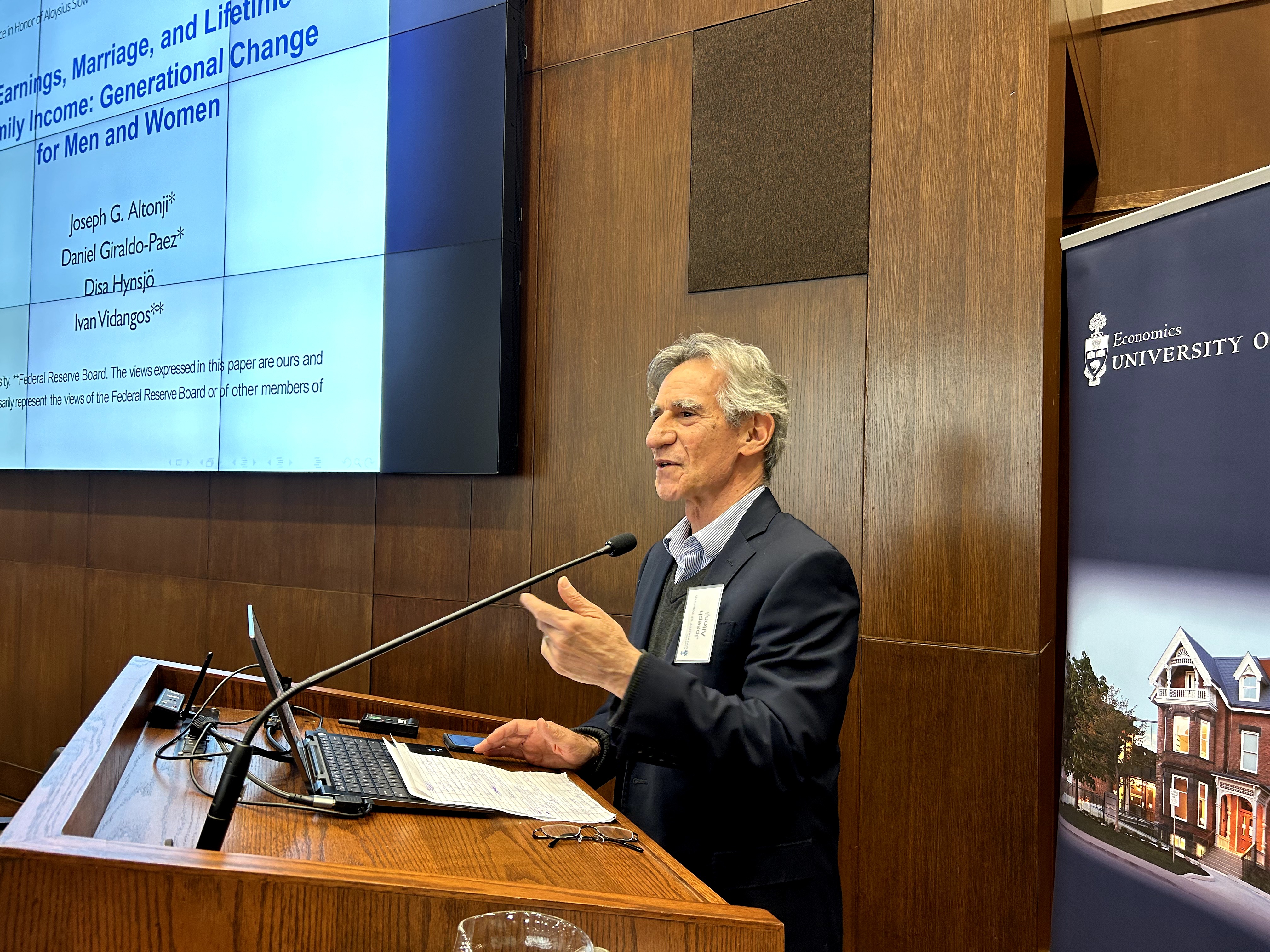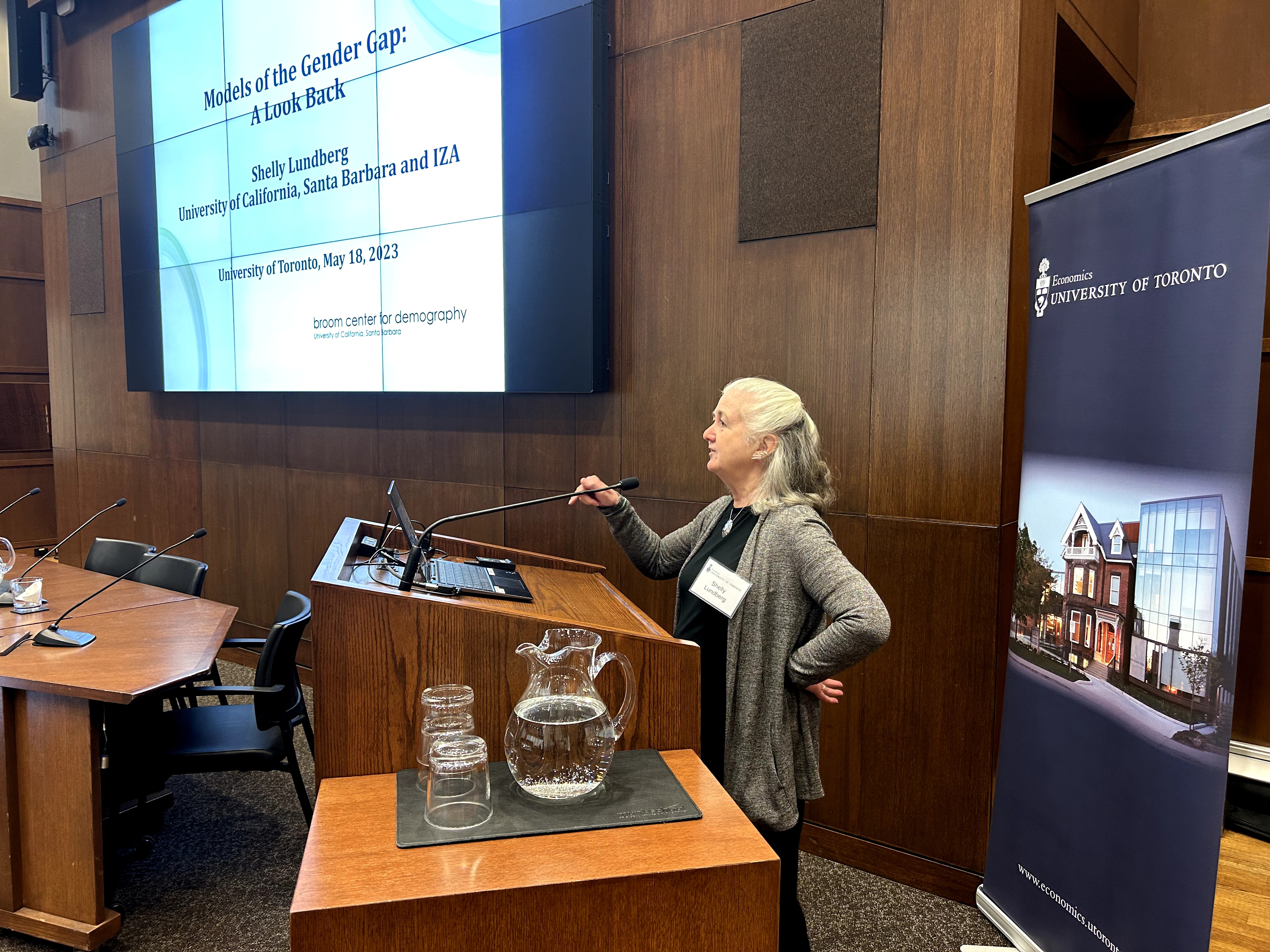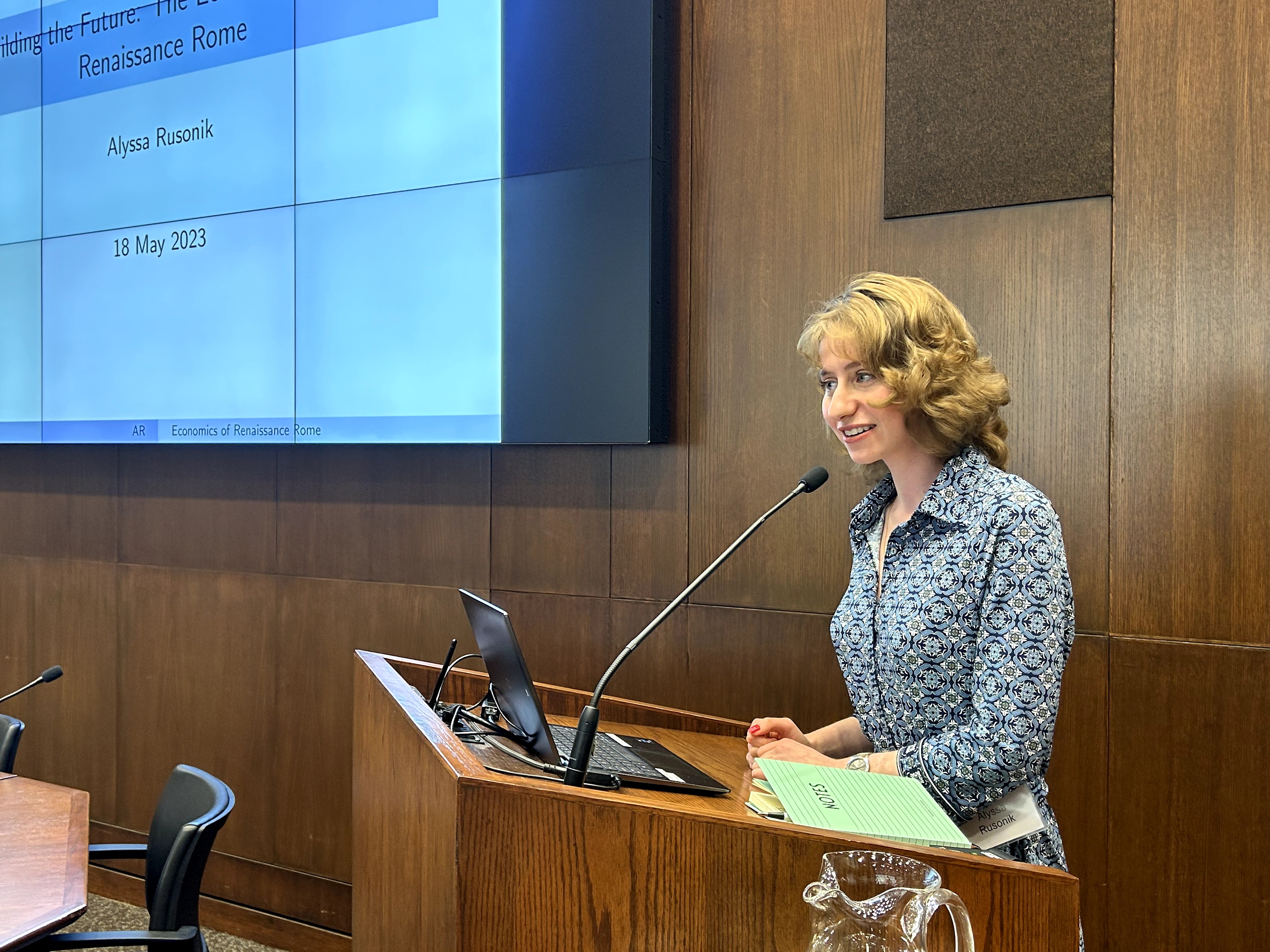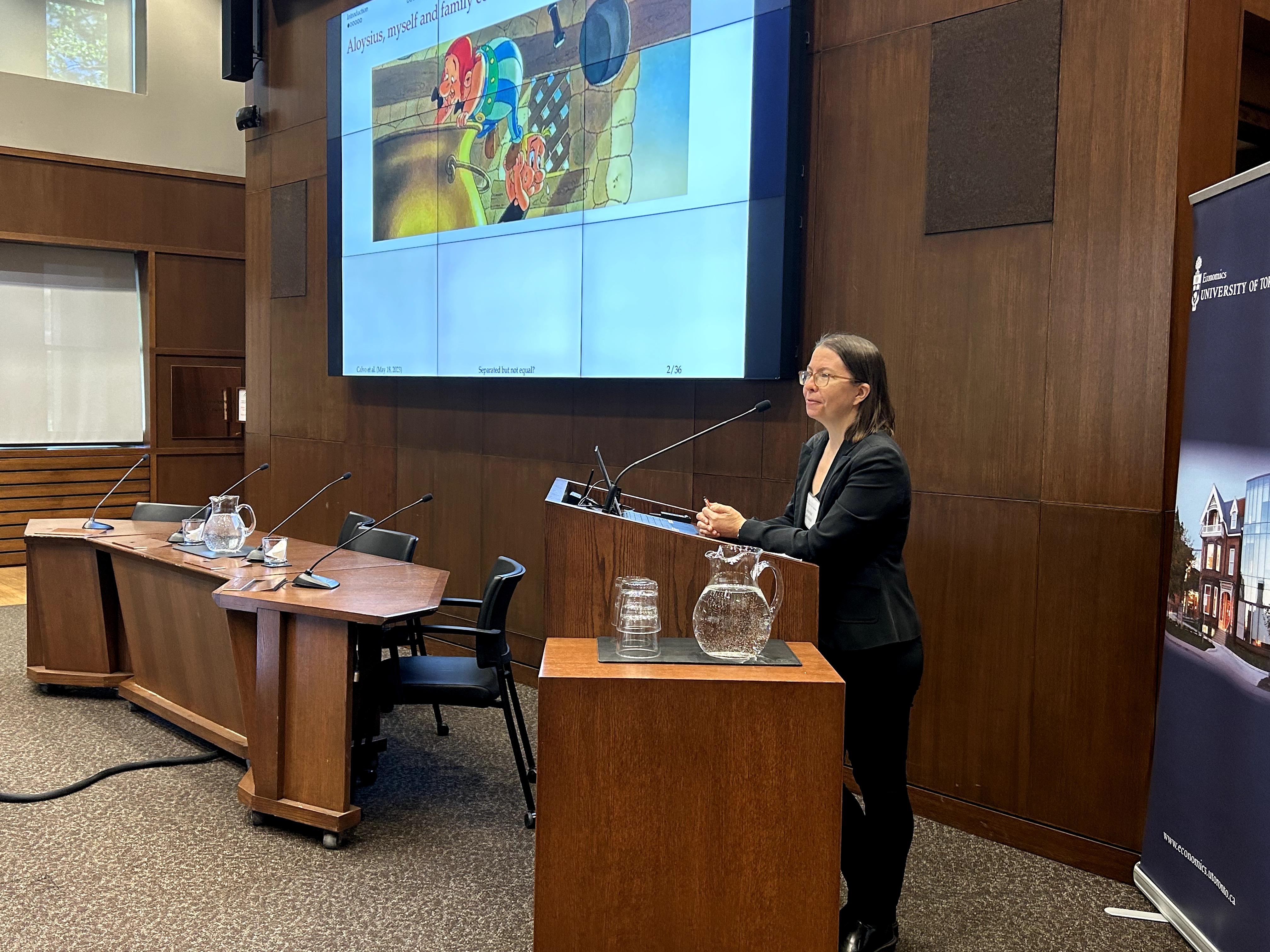Who marries whom, and why? For most, it’s a life-changing question. For Professor Aloysius Siow, it was also a question to explore using economic models.
The question became the title of one of Siow’s best-known papers Who Marries Whom, and Why? That publication was just one of the oft-cited references from Siow’s body of work at the All in the Family Conference. The May 18th event held at the University of Toronto was sponsored by the Department of Economics in the Faculty of Arts & Science in honour of Siow’s retirement. The event included specialists in economics of the family from North America, Europe and South America.
Siow’s own interest in the field coincided with his arrival at the University of Toronto over 25 years ago. After reading biologist Robert Trivers’ work Parental Investment and Sexual Selection, Siow realized there was well-known economic fallacy, the sunk cost fallacy, upon which Trivers based his argument.
“His argument was based on the study of the behavior of mammals,” Siow explained. “For example, he argued that a mother rabbit carries her fetus to term at a significant resource cost. The father contributes only sperm with minimal cost. Because the mother has invested so much more than the father in producing the offspring, the mother will want to invest more for the survival of the offspring compared with the father. This argument is the sunk cost fallacy in economics by which an investor justifies further investments because they made so much already. The correct argument is to base future investment on the expected return to the future investment, not the past investment. In applying Trivers’ theory to human behavior, I argued that because any future offspring for the couple will again involve the mother bearing a disproportionate cost of bring the future fetus to term, the mother will want to disproportionately invest in her current offspring compare to the father so as to minimize future pregnancies. A prediction of my model is that on average, wives will want fewer children than husbands which is consistent with survey responses on desired family size in many countries.”
The fallacy sparked Siow’s first major paper in the relatively new specialty of economics of the family, Differential Fecundity, Markets, and Gender Roles.
Aloysius Siow is an important member of the first substantial cohort of family economists — those who followed Becker and other pioneers of the field. One of his major contributions was the broad perspective he applied to family issues: bringing together biological, legal, market and social forces that shape families in rigorous economic models and sophisticated empirical frameworks. — Shelly Lundberg, Leonard Broom Professor of Demography and Distinguished Professor of Economics, University of California, Santa Barbara.
“When I finished the paper, I sent copies to well-known biologists like John Maynard Smith, who sent me a nice note back, to see if they knew about the sunk cost fallacy that Trivers made,” Siow remembered. “Of course, they did! They called it the Concorde Fallacy in biology whereby the British government justified spending more money on supporting the Concorde supersonic plane because they spent so much already. Since the application of the model to humans was new, I just kept going.”
What followed was a research career Siow describes as being primarily motivated by scientific anomalies.
“An anomaly is a systematic behavior which is unexplained by current scientific knowledge. Every research area will have several well-known anomalies,” he told the conference audience. “The scientific community will periodically discover a new tool, either theoretical, computational, or new sources of data. When I learn of the arrival of a new tool, I ask whether it can be used to solve the anomalies which I carry in my head. If I think that this new tool may work, I look among my colleagues as to who has the skills to use this new tool and try to convince them to work with me to solve my anomaly.”

Organized Ettore Damiano, chair of the Department of Economics, Professors Gustavo Bobonis, Shari Eli, Rob McMillan and Rahul Deb, with the assistance of department event planner Adriano Macedo, the conference reflected every aspect of Siow’s career in teaching and research.
Contributors included Maristella Botticini via video from Bocconi University in Milan. She was Siow’s co-author on the seminal paper Why Dowries? Joseph Altonji of Yale who co-authored Testing the Response of Consumption to Income Changes with (Noisy) Panel Data with Siow was also in attendance. Former student, Joshua Lewis of the University of Montreal, presented From Boom to Bust: The Great Depression and Women’s Fertility.
The work presented acknowledged Siow’s influence in shaping both teaching and research in economics of the family as a field.
“Aloysius Siow is an important member of the first substantial cohort of family economists — those who followed Becker and other pioneers of the field. One of his major contributions was the broad perspective he applied to family issues: bringing together biological, legal, market and social forces that shape families in rigorous economic models and sophisticated empirical frameworks,” said Shelly Lundberg of the University of California at Santa Barbara.
Lundberg, who presented Models of the Gender Gap, a Look Back at the conference as “an exercise in nostalgia,” believes Siow’s influence will continue post-retirement.

“We can see from the papers at the conference that this panoramic view of families influencing market outcomes and markets affecting family structures has continued to inspire younger researchers as they expand further the footprint of economics,” Lundberg said.
One of those younger researchers is Alyssa Rusonik a PhD candidate in the finance department at HEC, Paris, is a former student. Siow was her undergraduate senior thesis advisor during the 2021-2022 academic year.
“I met Aloysius in the last year of my undergraduate degree. He became my senior thesis supervisor. At every opportunity, Aloysius encouraged ambition, had the forbearance to let students take risks and learn from mistakes, and shared his incisive comments freely,” Rusonik remembered. “His excitement was contagious, his questions always thought-provoking. It’s impossible to express how profound an effect his guidance has had on all of my work. I know I speak on behalf of many others when I say I would certainly not be where I am today if not for Aloysius’s unwavering dedication to students.”
Jeanne Lafortune, currently professor of economics and director of research at the Pontifical Catholic University of Chile, is also a former student. She agrees that Siow’s enthusiasm was inspirational to his students.

“I first met Professor Siow when I took his graduate class in labor economics,” Lafortune recalled. “What I remember is that he was not that easy to follow, but he was extremely enthusiastic about what he was working on. That’s what got me into the field.”
Lafortune’s presentation at the conference, Separate but Not Equal, was to explain why some women choose to separate rather than divorce. The data evidenced that separated women are financially worse off than divorced women because they do not have court-enforced transfers of marital assets. Like Lundberg, Lafortune does not see Siow’s influence in the field diminishing any time soon.
“I think it will be very difficult for Siow to completely leave research after this being a cornerstone of his life for so many years,” she said. “With Laura Salisbury of York University and Professor Siow, we are currently working on an article for the Journal of Economic Literature that seeks to use one of the main contributions of Siow to economics of the family to understand how American families have changed over the last 100 years. I think his influence will continue through his existing work, the seeds of interest he planted in so many students and the continued intellectual curiosity he shows every time one interacts with him.”

For his part, Siow believes there are more models that will come to the fore as work in the field progresses.
“There are many paths to a successful research career for both students and junior scholars. So, each researcher must find a path which works for them,” he told the conference. “In the policy sphere, economists will continue to play a significant role. The reason is that economics study behavior under scarcity. The public sphere has many competing demands for scarce funds. So economic analysis and advice fits right in … the demand for economics and economists will not be falling any time soon.”
For his part, Siow is looking forward to being a more engaged grandfather as his family grows. And as is in keeping with a family economist, his last words at the conference were directed at both his university and actual family.
“I have had a very good career at the University of Toronto. The students are academically strong, and I have enjoyed teaching them. The administration at the Department of Economics has been supportive,” Siow said in his address to the conference. “I have also had a good research career. I first need to thank my wife Randee, who had a successful career of her own, and my children who gave me as much time as I wanted to spend on my work. My colleagues and co-authors were also great to work with.”
The conference was recorded at the Munk School of Global Affairs & Public Policy:
- Watch the morning proceedings that featured an opening address by Professor Gustavo Bobonis and presentations by Jeanne Lafortune, Joseph Altonji and Joshua Lewis.
- Watch the afternoon program of presentations by Shelly Lundberg, Maristella Botticini, and Alyssa Rusonik . The video closes with remarks from Siow himself.

